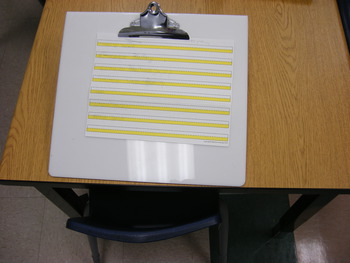During my first Level II Fieldwork, I worked with a student who, in addition to a diagnosis of intellectual developmental disorder, could not see well. She did not have glasses, and during reading and writing activities, she would lean over until her face was about two inches away from the table. I talked to my fieldwork educators (FE’s) and the teacher about why her impaired vision hadn’t been addressed. They had said they had done everything possible and had talked to the mother (her guardian and caretaker) and she avoided getting her daughter glasses. We all knew this student had a vision problem and it was affecting her performance at school, especially writing.
I looked for any available avenue to help this girl. I asked my FE’s about the possibility of the school paying for part of the cost of an eye exam and glasses. I also asked about the possibility of referring her to an ophthalmologist; my FE’s told me that the school didn’t have a case manager or appropriate medical staff, so this would not be possible. After discussing the issue with my FE’s, we decided that the best solution would be to have the facilitator bring the issue up at an IEP meeting. I also looked for some interim solutions to help, and came up with the idea of getting her some highlighted paper and a slantboard. I asked my FE’s about getting her temporary glasses to help, but we didn’t want to accidentally make things worse; she needed to see a trained ophthalmologist. At the IEP meeting, the facilitator referred the mother to a case manager with the school district to assist with some related issues at home.
I felt frustrated about this situation; I discovered this had been going for several years, and I was simply perplexed that it could be allowed to go on so long. This student had been at the same school for several years, and there had been no progress towards correcting her vision.
It was difficult to press others for details and to coordinate with my FE’s and the teacher. I explored every possible solution: Is there a referral we could give to an eye doctor? Can we provide glasses for her as a school? Are there any resources that are available at the school that could help?
Finally, I asked if there was a case manager that could help; no one seemed to know if a case manager worked at the school. I knew I had to do something about the situation and I was afraid that after I left everyone would give up. We talked to the facilitator, who agreed to bring up the idea of referring her to a case manager at the IEP meeting. The facilitator walked through many of the different options with the mother. The mother agreed to contact the case manager and see if the case manager could help with their complex home situation.
I pursued social justice by advocating for this student. I provided her with a slant board and highlighted paper until the situation could be resolved; I consulted with the teacher about how to use these adaptive items in the classroom. I learned you can make a difference by being the voice for students. I kept hearing the student’s voice in my head when I slept; it was as if she were screaming that if she could advocate for herself she would. I learned how important it is to work in collaboration with others such as teachers to figure out an action plan. This was a perfect example of occupational deprivation: she wasn’t getting the resources she needed and someone had to advocate for her.
